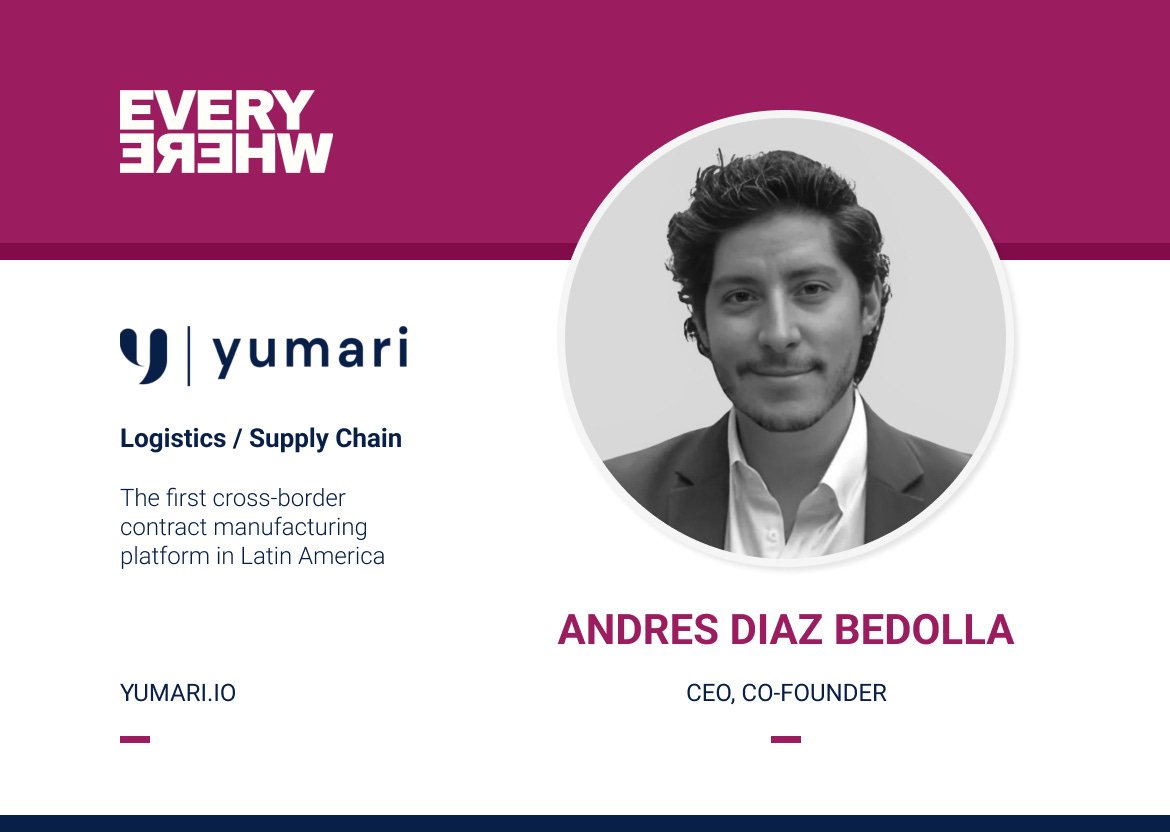Founders Everywhere: Andres Diaz Bedolla
Andres Diaz Bedolla is the co-founder and CEO of Yumari, an integrated sourcing, production, and supply chain management platform.
Welcome to Founders Everywhere, where we highlight the incredible people behind the companies we’ve backed at Everywhere Ventures, a global pre-seed fund supported by a community of 500 founders and operators.
Manufacturers across Latin America are often overlooked, but not because they lack expertise or quality, but because they lack the digital infrastructure needed to compete on a global scale. Founded in Mexico in 2023, Yumari emerged from a vision to transform traditional manufacturing approaches. They recognized the challenges businesses faced with offshore manufacturing and nearshoring, so they set out to help manufacturers digitize, standardize, and showcase their capabilities around the world. The manufacturing landscape in Latin America is incredibly vast and diverse, so Yumari chose to start with the apparel and textile categories, sectors with strong regional foundations and consistent global demand. By narrowing their initial focus, Yumari can go deep by building high-quality data, onboarding trusted suppliers, and proving the model, before expanding to other verticals across the broader manufacturing ecosystem.
Co-founders Andrés Diaz Bedolla, CEO, and Sergio Masse, COO, have been business partners for over 14 years. They started out as roommates in Shanghai and launched their first venture, Beacon Group Limited, in Hong Kong. After expanding into mainland China, the company was acquired in 2018 by a leader connected to China’s Belt and Road Initiative. Following the acquisition, both joined Alibaba, where they worked on global initiatives, before founding Yumari. They brought co-founder and CTO Taliesin Oppenheimer onto the team, who brings deep technical expertise and a background in supply chain optimization and digital transformation. Andres shares more about how they are building the first cross-border B2B trade platform in Latin America.
What’s the inspiration behind Yumari?
My whole life has been about cross-border trade. It’s kind of been my obsession. I started my career in Mexico's government working on trade and investment, then moved to China to understand how they scaled their manufacturing to lift 700 million people out of poverty. I spent ten years there, including leading Alibaba’s Global Initiatives for Latin America, thinking I could help integrate suppliers from the Americas into global supply chains. But when I returned to Mexico, I realized how far behind the region was in digitization and trade infrastructure. Unlike China, where manufacturers respond quickly and have comprehensive online profiles, Latin American factories lacked that foundation. I saw firsthand that we weren’t playing the same game. That’s when I knew we needed a platform tailored to the realities of our region and that’s how Yumari was born.
What’s Yumari’s North Star?
Our North Star is to create seamless, digitized supply chains that are more diversified and less dependent on Asia. We’re focused on empowering Latin American manufacturers by making them digitally discoverable and more responsive to demand, especially for fast-growing consumer brands. We’ve found that even major DTC brands struggle with supply chain challenges. By focusing on high-demand, repeatable categories like apparel, Yumari acts as an outsourced supply chain office, bringing structure and clarity to the fragmented supplier data across the region.
Why is Yumari going to win?
We’re not just another marketplace; we’re building the infrastructure that Latin American manufacturers actually need to participate in global trade. Most platforms assume a level of digitization and readiness that just doesn’t exist here. At Yumari, we meet factories where they are, helping them digitize their operations and present themselves professionally to international buyers. Most manufacturers are family-run and operate within tight-knit local or regional networks. We’ve spent years building deep relationships on the ground by visiting factories, meeting families, and understanding the real challenges. That level of immersion and long-term commitment is what allows us to design tools and systems that actually work for this market.
How is Yumari different from other B2B marketplaces?
We flipped the model. Instead of starting with the suppliers, we start with the buyers. We collect RFQs (requests for quotations), then match them with vetted manufacturers. Because suppliers in our region don’t have data upfront, we realized we couldn’t build a typical open marketplace. Instead, we collect data through the quoting process and structure it ourselves. Over time, this helped us build a rich dataset that we could train an LLM on, enabling pre-quotes even before factories respond. We also decided against pay-to-rank and show buyers only the most relevant manufacturers, not the ones who pay the most.
Why the name Yumari?
It's the rain and prosperity dance for a northern indigenous community called the Raramuri, in Chihuahua. We chose it because it reflects our mission to bring growth, prosperity, and opportunity to the region through trade and manufacturing. It’s also a name that feels universal and easy to pronounce in any language, which was important for a platform designed to connect global supply chains.
Interesting fact:
I’ve experienced two heart attacks before turning 38, with the most recent triggered by a respiratory virus that caused pericarditis and swelling of my heart. When people ask if work stress was to blame, I always say the opposite—my work is my passion, my hobby, and actually how I unwind and de-stress.
Listen to Fifi Kara with Alessandra Henderson on the Venture Everywhere podcast: Aster in Women’s Health. Now on Apple & Spotify and check out all our past episodes here!


